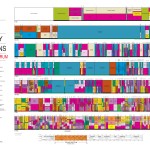Like Milton, I’m very worried about the political vulnerabilities that might arise if the wireless sector grows more concentrated. Still, I think it’s a big mistake to legitimize one repressive incarnation of coercive state power (antitrust intervention) to reduce the likelihood that another incarnation (information control) will intensify. This approach is not only defeatist, as Hance argues, but it also requires a tactical assessment that rests on several dubious assumptions.
First, Milton overestimates the marginal risk that the AT&T – T-Mobile deal will pave the way for an information control regime. The wireless market isn’t static; the disappearance of T-Mobile as an independent entity (which may well occur regardless of whether this deal goes through) hardly means we’re forever “doomed” to live with 3 nationwide wireless players. With major spectrum auctions likely on the horizon, and the possibility of existing spectrum holdings being combined in creative ways, the eventual emergence of one or more nationwide wireless competitors is quite possible — especially if, as skeptics of the AT&T – T-Mobile deal often argue, the wireless market underperforms in the years following the acquisition.
More importantly, network operators, like almost all Internet gatekeepers, face mounting pressure from their users not to facilitate censorship, surveillance, and repression. Case in point: AT&T is a leading member of the Digital Due Process coalition (to which I also belong) that’s urging Congress to substantially strengthen the 1986 federal statute that governs law enforcement access to private electronic communications. Consider that AT&T’s position on this major issue is officially at odds with the official position of the same Justice Department that’s currently reviewing the AT&T – T-Mobile deal. Would a docile, subservient network operator challenge its state overseers so publicly?



 The Technology Liberation Front is the tech policy blog dedicated to keeping politicians' hands off the 'net and everything else related to technology.
The Technology Liberation Front is the tech policy blog dedicated to keeping politicians' hands off the 'net and everything else related to technology.